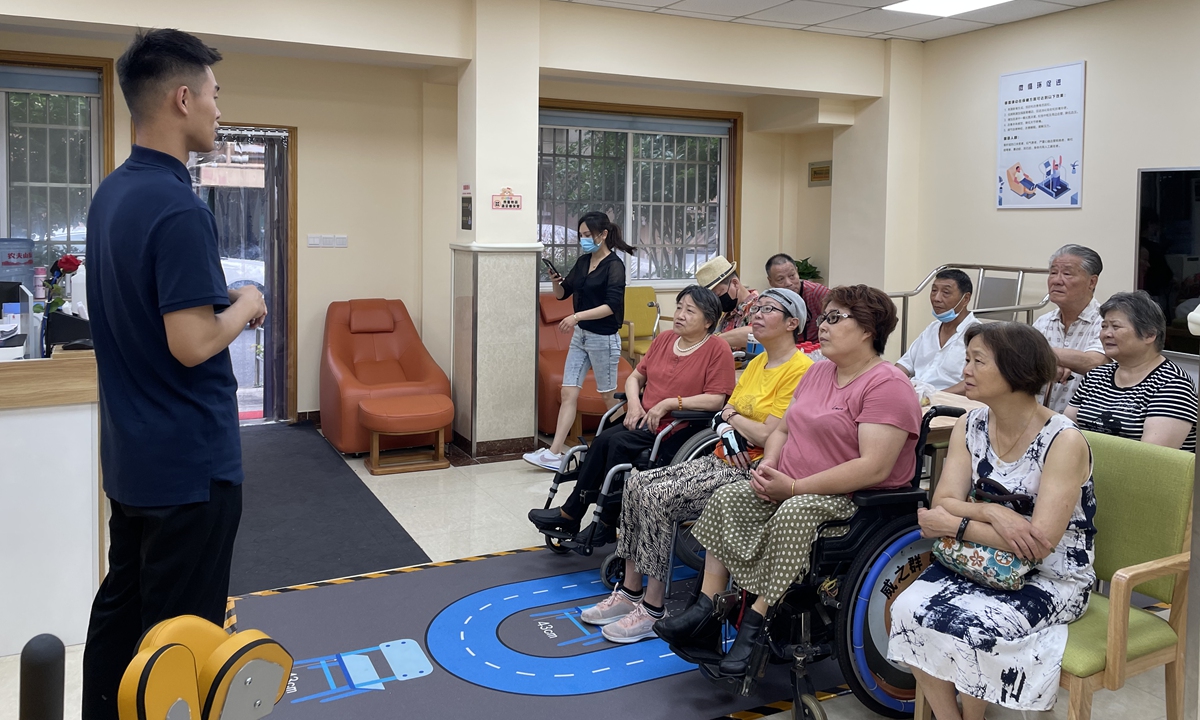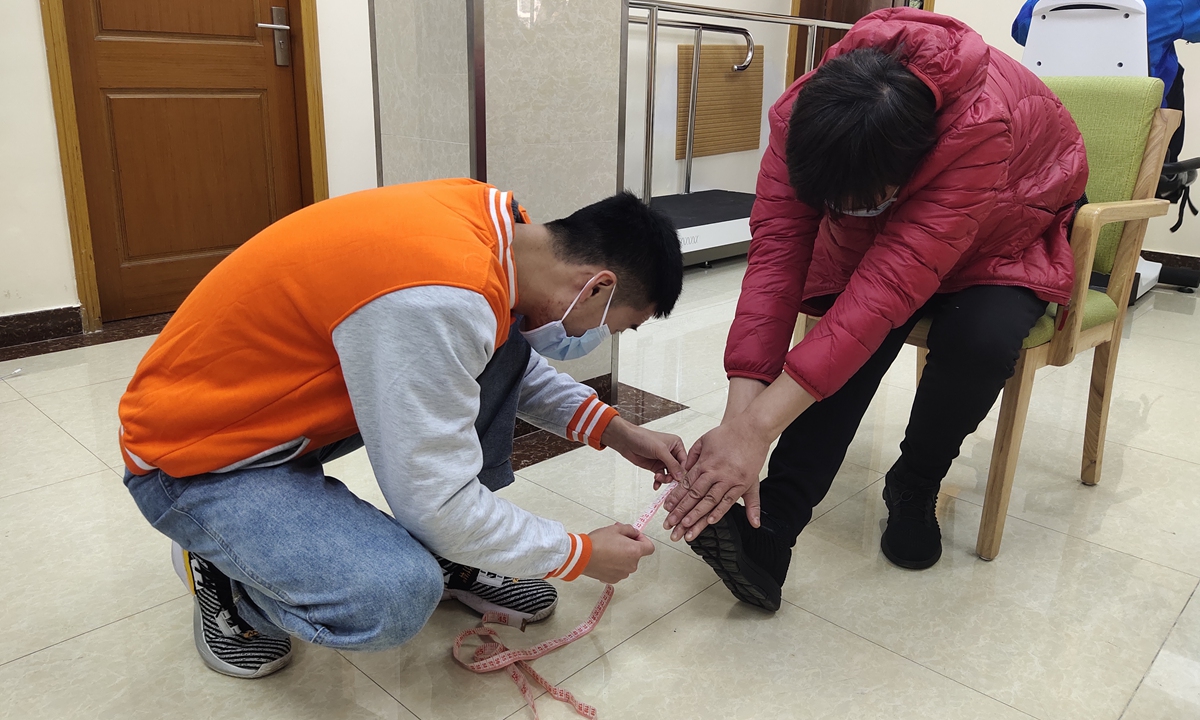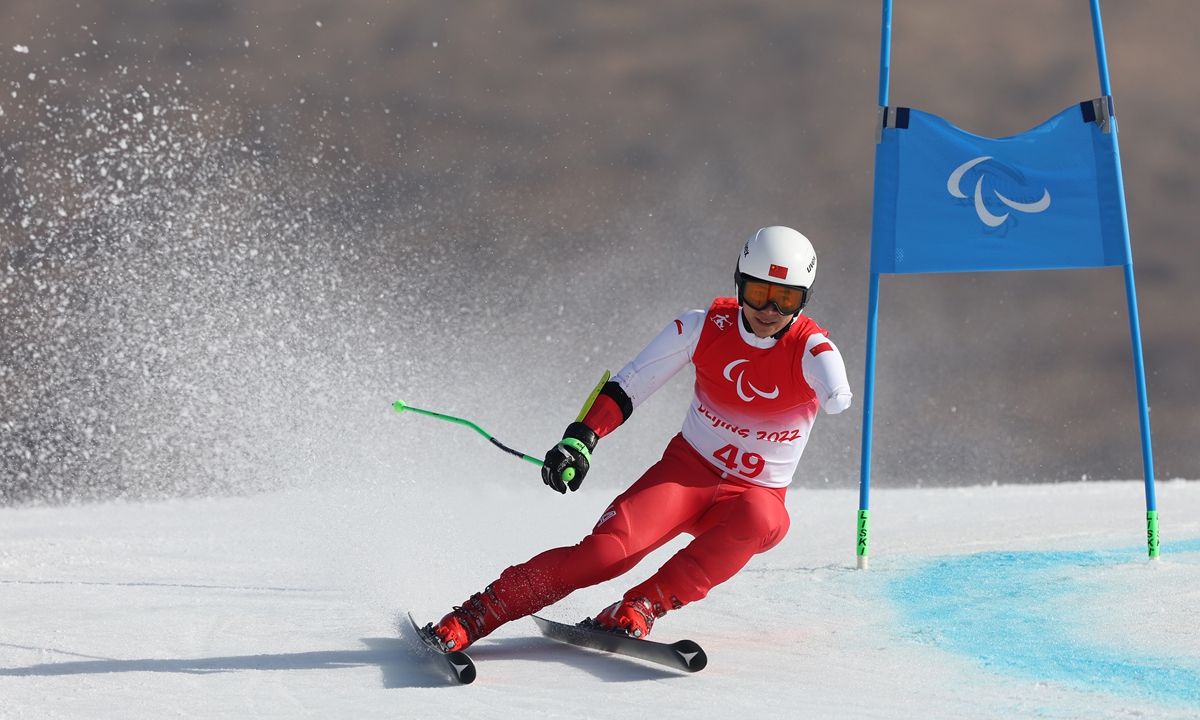
Zhang Mingkai gives a health and fitness lecture for residents with disabilities at a fitness center at Changqiao subdistrict in Shanghai. Photo: Courtesy of Zhang Mingkai
With the help of a fitness coach, Shanghai resident Shen Ling (pseudonym) slowly pushes her wheelchair onto a piece of exercise equipment. She holds the handrails, moving the wheelchair little by little with the strength of her waist. The equipment helps Shen improve her balance and metabolism.
Having been stuck in a wheelchair for more than 40 years after falling from a building during childhood, Shen is quite happy with the fitness center near her home, which is dedicated to serving people with disabilities.
"It was difficult for me to find a place to exercise," Shen said.
"But now, I can exercise with the right facilities under the guidance of professional coaches for free."
The athletes at the ongoing Beijing Paralympic Winter Games have impressed global audiences with their spirit and dedication. Apart from professional athletes, an increasing number of general Chinese citizens with disabilities have started enjoying various public sports services provided specifically for them, said Wu Xueping, a professor at the Shanghai University of Sport (SUS), who has been researching physical training and rehabilitation of people with disabilities for 20 years.
"They are getting healthier and more confident with the help of the entire society," Wu told the Global Times.
Expanding servicesShen lives in the Changqiao subdistrict in downtown Shanghai, where there are nearly 3,000 residents with disabilities. To better help them with physical therapy and daily exercise, the subdistrict opened in May 2021 a 40-square-meter fitness center with more than 10 sets of exercise equipment for people with disabilities.
Including the one in Changqiao, at present four Shanghai subdistricts have opened similar fitness centers for residents with disabilities, Wu said. Her team of SUS sports professionals worked with the Shanghai Disabled Persons' Federation in building these centers. "We expect to build a total of 10 by the end of this year," Wu said.
These fitness centers offer various aerobic, weight, stretching and rehabilitation exercises for people with different kinds and degrees of disability, Wu introduced. Fitness coaches and advisors there give users a simple physical examination including measuring blood pressure, and give recommendations on suitable exercising methods and duration based on their condition.
Wu's student Zhang Mingkai, who is a PhD student in adapted physical activity at SUS, serves as an advisor at the Changqiao fitness center. He goes to the center every two or three weeks, teaching users there correct exercise techniques.
"It's pleasing and inspiring to see them improve physically and mentally," Zhang told the Global Times.
He recalled one young lady who had become very depressed after a car accident left her with lower limb paralysis.
"She was reluctant to talk to anyone at the beginning," Zhang said.
"Fortunately, she has become outgoing and optimistic after physical therapy at the center."

A Shanghai University of Sport student helps a resident with disability do a simple physical examination at a fitness center at Changqiao subdistrict in Shanghai. Photo: Courtesy of Zhang Mingkai
For people with disabilities, the fitness centers are not only venues for exercising, but also places where they can socialize, Wu said.
Out of fear of possible strange looks from others, many residents with disabilities used to stay at home all day, Wu said.
"But now at the fitness centers, they make friends with their peers, and enjoy the help provided by the center's staffers and volunteers," she said.
"There is no discrimination, only care and love."
A bigger group behind ParalympicsThere are 96 Chinese athletes competing in the six major events at the Beijing Paralympic Winter Games. At SUS, a supportive team consisting of sports specialists led by Wu has been providing training and rehabilitation services for the alpine skiing, ski jumping, ice hockey and skeleton athletes of Team China.
Besides the good performance of athletes, 85 million Chinese people with disabilities are getting more involved in daily exercises and health. Official data shows that 23.9 percent of residents with disabilities have participated in community recreational and sports activities as of 2021, a surge from 6.8 percent in 2015.
In Shanghai, apart from the fitness centers in the subdistricts, Wu's team collaborates with local authorities to conduct regular fitness and health monitoring for residents with disabilities.

Sun Yanlong of Team China competes during the men's giant slalom standing Run 1 at the Beijing 2022 Winter Paralympics on March 10, 2022. Photo: VCG
Understanding the physical health of people with disabilities is the basis for offering them scientific rehabilitation and exercise guidance, Wu noted. Her team has completed monitoring surveys for nearly 20,000 residents with disabilities in Shanghai, and plans to cover 50,000 to 60,000 more by 2025.
Wu believes that the value of the Paralympics is that it raises public awareness for people with disabilities.
"They are a part of our society, and they deserve better public sports services under the national fitness program," she told the Global Times.






